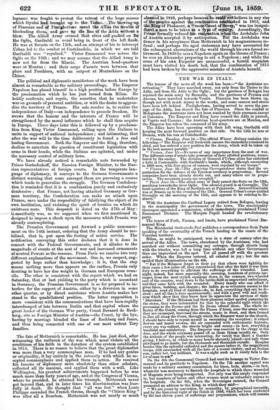The fate of Metternich is remarkable. He has just died,
after witnessing the outbreak of the war which must violate all the conditions of his faith in the duration of the system established in 1815. There is no reason to believe that the great diplomatist was more than a very commonplace man. If he had any genius or originality, it lay entirely in the intensity with which he ac- cepted commonplaces and applied them in action. He received his lessons of diplomacy more absolutely than other scholars, collected all its maxims, and applied them with a will. Like Wellington, his greatest achievements happened before he was much more than forty years of age, and at the Congress of Vienna, where he presided, he attained his triumph. Metternich never got beyond that, and in later times his discrimination was fear- fully at fault. He thought that "all was lost" when Louis Philippe ascended the French throne, though the "Citizen King" was after all a Bourbon. Metternich was not nearly so much
alarmed in 1848, perhaps because he could not believe in any rise of the peoples against the combination established in 1815, and the King of Piedmont, a "mere Count of Savoy," was too insigni- ficant a man to be taken as a type of royalty. Accordingly, the Prince formally refused bin. resignation when the Archduke John of Austria accepted it by anticipation. But the Archduke was firmer in his acceptance than Metternich in his magnanimous re- fusal ; and perhaps the aged statesman may have accounted for the subsequent aberrations of the world through his own forced re- tirement. In 1859 he sees a Napoleon again on the throne of France ; he sees an Alexander preparing to aid a Napoleon; and while the arms of his own Emperor are unsuccessful, a horrid susRicion must have visited his death bed, that the combination of 1815 had been broken by the aggressive mistake of Austria herself.


































 Previous page
Previous page